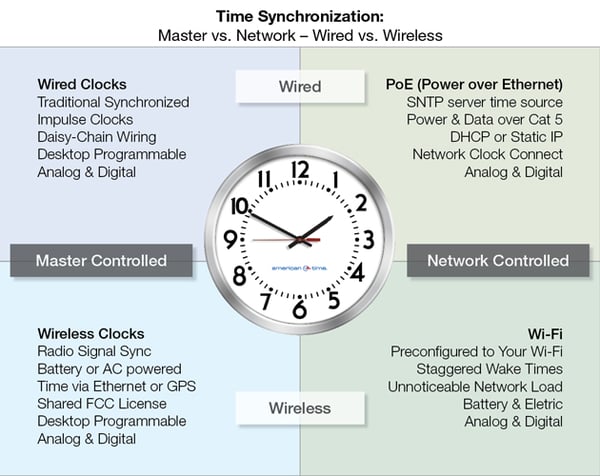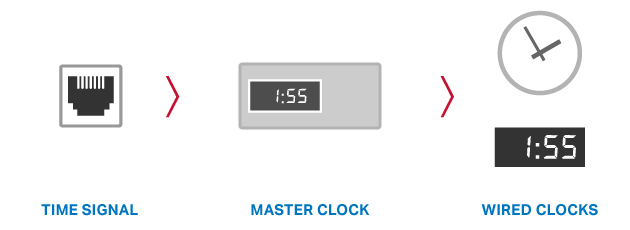Accurate, synchronized clocks in your building, school or facility are more than a convenience. When clocks display the wrong time or different times from each other, major disruptions and even risks can happen, such as….
- Meetings, classes or shifts start and end at different times, causing confusion and inefficiency
- Wages or compensation are disputed
- Critical tasks like surgeries, food prep or manufacturing processes aren’t tracked or reported accurately
- Maintenance staff spend too much time on clock repairs and adjustments
|
“Employees didn’t have reliable clocks for calculating shift changes or break times. There were lots of debates about whether an employee was really tardy or not, whether some people were abusing their break times by leaving early and returning late, and whether meetings were starting and ending on time.” |
What is Synchronized Time?
Synchronized time is when all the clocks in your office or building show the same, precise time. They automatically adjust each day to keep accurate time, and they automatically update for daylight saving time (DST) changes if DST is observed in your area.
|
“Our meetings flow better because everyone sees the same start and stop times, and we experience better operational efficiencies on the production side as well.” |
How Clocks Know the Right Time: The 4 Best Technologies
There are several ways clocks “know” and adjust to the correct time. The four core technologies for modern clock systems are: Wireless, Wi-Fi, Power over Ethernet (PoE) and Wired.
All of these clock technologies keep extremely precise time (accurate to 1/10 of a second) and ensure every clock on the system displays the correct time. All clock systems automatically update for DST and have choices of analog or digital clocks.

Wireless Clock System Technology
A wireless system’s Master Clock (also called a “system controller”) automatically receives a time signal via Ethernet or GPS satellites. The Master then sends a signal to each wireless clock using a radio frequency. Analog wireless clocks (those with a clock face) can be powered by AC power (120v or 24v) or by battery. Digital wireless clocks are AC-powered only.
An unlimited number of clocks can receive the time synchronization signal from the Master. An entire building or campus will have complete coverage with either a 5, 10 and 30-watt Masters.
Wireless clock system technology is one of the most popular ways to get synchronized time because it is…
- Quick to install
- Communicates wirelessly, only requiring a local 120 VAC
- Can be used to expand an existing wired clock system (think: building expansion or remodel)
- Requires little maintenance (clocks can operate up to five years on battery power)
- Battery-powered clocks can be installed anywhere in a room
A wireless clock system might not be the best choice for you if….
- You don’t have access to a central location where the Master Clock can be located
- You don’t have AC power or an Ethernet drop
- You don’t have an auxiliary power source, which is needed for electric AC powered clocks to operate in a power outage (battery-powered clocks will stay on time)
You can’t get a signal in the places you need synchronized time, such as a lead-lined room (this is very rare).
PoE Clock System Technology
Power over Ethernet (PoE) network clocks draw both power and time updates from your existing Ethernet connection. There’s no need for a Master Clock, AC receptacles or batteries.
The main benefits of a PoE clock system include….
- Easy plug-and-play installation
- No need for outlets or batteries
- Very energy efficient
- Low maintenance
- No Master Clock required as the clocks utilize your existing network
On the other hand, some organizations don’t choose a PoE clock system because PoE requires a network drop and PoE port on the network switch. In addition, clock placement in a room depends on the location of the Cat 5 cable.
Wi-Fi Clock System Technology
A Wi-Fi clock system simply uses an existing Wi-Fi network to pull accurate time and keep all clocks in a building or campus displaying the correct time. No need for a Master Clock, wires or other equipment. Analog Wi-Fi clocks (those with a clock face) can be powered by AC power (120v or 24v) or by battery. Digital Wi-Fi clocks are AC-powered only.
Many organizations choose a Wi-Fi clock system because….
- It is one of the quickest and most economical ways to get synchronized time
- There is no noticeable impact on Wi-Fi speeds
- Battery-powered Wi-Fi clocks can be placed anywhere there’s a Wi-Fi signal
- No Master Clock required as the clocks utilize your existing network
A Wi-Fi clock system may not be the best choice for you if you don’t have a strong, reliable Wi-Fi signal everywhere that you need synchronized time.
Wired Clock System Technology
Like a wireless clock system, wired clocks have a Master Clock that supplies a signal and the correct time. It sends out a signal hourly and every 12 hours to keep the clocks on the right time.
 As its name suggests, clocks in this type of clock system are hard wired to the Master and to a power source.
As its name suggests, clocks in this type of clock system are hard wired to the Master and to a power source.
Nowadays, it’s rare for organizations to implement an entirely new wired clock system because more cost-effective options exist for synchronized time. However, older buildings with an existing wired system appreciate newer wired technology that extends the life and ROI of their clocks.
With a wired synchronized clock system, you can….
- Centralize control over a legacy wired system
- Streamline management of and control wired clocks, bells, lights and locks
- Replace old, major-brand clocks with more efficient AllSync Plus clocks
A new wired clock system may not be the best option for you if….
- You don’t have a licensed electrician who can install the initial 120vac system
- Want to avoid costs of conduit and wiring
- You want more freedom in where you hang clocks




